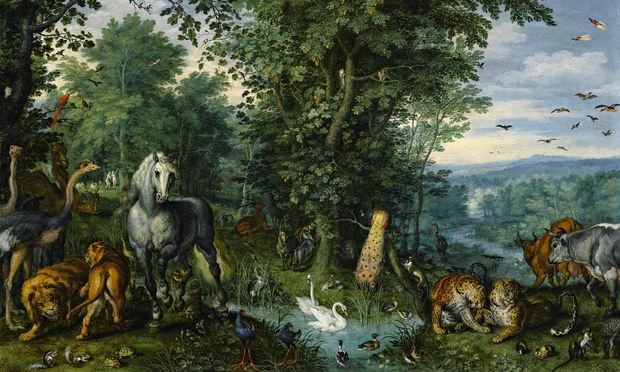
The UK is pulling out all the stops in its attempt to prevent a landscape painting by Flemish artist Jan Brueghel the Elder from being transported to an overseas buyer. According to the Guardian, the government has issued a temporary export ban to keep the early 17th-century painting in British hands.
In mid-July, The Garden of Eden With the Fall of Man (1613) sold at Sotheby’s in London more than doubling its pre-sale high estimate of £3 million (roughly $5.1 million) when it fetched £6.8 million ($10.6 million) from a foreign bidder. But when experts determined that the small oil on copper work was culturally and artistically significant, culture minister Ed Vaizey put a ban on its export, giving the UK until March 4, 2015 to find a domestic buyer to match the price for the work.
The painting was last on the market in 1853, when it was purchased by Algernon Percy, the fourth Duke of Northumberland, and has since remained with the family. The Garden of Eden, with its detailed flora and fauna, depicting the moment before Adam and Eve committed sin, is considered a particularly fine example of Brueghel’s work.
The success of such export ban has been mixed in recent months. While Kate Middleton’s support helped London’s National Portrait Gallery save Van Dyck‘s Self Portrait (1641) in May (see Van Dyck Self Portrait Bought by London’s National Portrait Gallery Thanks to Public Appeal), and the Victoria and Albert Museum was able to purchase a Napoleonic cabinet (see Fundraising Campaign Saves Napoleonic Cabinet), no UK institution was able to do the same for a rare Charles Le Brun portrait, which sold to New York’s Metropolitan Museum of Art after a three-month ban.
Meanwhile, the UK had a rare second bite at the apple for the Royal Geographic Society‘s Thomas Baines collection when the Australian buyer renegotiated the price this summer, but a new export license for the works was ultimately granted (see Fire-sale of Royal Geographical Society Paintings).